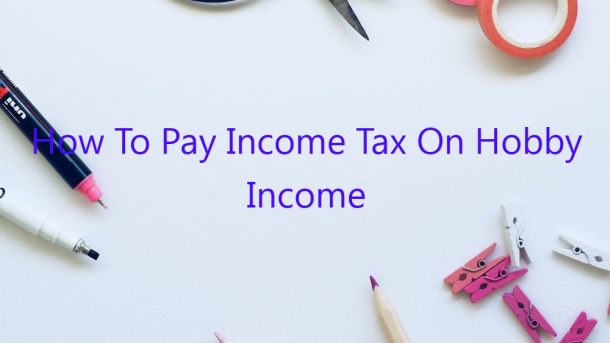Income tax on hobby income is a topic that often confuses taxpayers. That’s because the rules governing how hobby income is taxed can be a bit complicated. Here’s a guide to help you understand the basics.
What is hobby income?
Hobby income is any income you earn from a hobby. This can include income from selling products or services related to your hobby, as well as income from investments or royalties related to your hobby.
How is hobby income taxed?
The amount of tax you owe on your hobby income depends on how the income is classified. Generally, there are three ways hobby income can be classified:
1. Ordinary income: This is the most common type of hobby income, and it is taxed like any other type of income.
2. Capital gains: This type of income is generated when you sell something you’ve bought for less than you sold it for. Capital gains income is taxed at a lower rate than ordinary income.
3. Self-employment income: If you earn income from your hobby by providing services or selling products, that income is considered self-employment income. Self-employment income is subject to both income tax and self-employment tax.
Which classification applies to your hobby income will depend on a variety of factors, including how you earn the income and how often you earn it. For example, if you sell products you’ve made yourself on a sporadic basis, your income is more likely to be classified as capital gains income. However, if you provide services related to your hobby on a regular basis, your income is more likely to be classified as self-employment income.
What are the tax rates for hobby income?
The tax rates for hobby income can vary depending on the type of income it is classified as. The tax rates for ordinary income, capital gains income, and self-employment income are all different.
For 2017, the tax rates for ordinary income range from 10% to 39.6%, while the tax rates for capital gains income range from 0% to 20%. The tax rates for self-employment income range from 12.4% to 15.3%, depending on your income level.
How do I report hobby income on my tax return?
The way you report hobby income on your tax return will depend on how the income is classified. If the income is classified as ordinary income, you will report it on line 21 of your Form 1040. If the income is classified as capital gains income, you will report it on Schedule D. If the income is classified as self-employment income, you will report it on Schedule C.
It’s important to note that you may be required to report hobby income even if you don’t receive a Form 1099 from the IRS. For example, if you sell products or services related to your hobby, you will likely be required to report the income on your tax return.
Can I deduct expenses related to my hobby?
You may be able to deduct certain expenses related to your hobby. This includes expenses such as the cost of materials used in your hobby, the cost of equipment used in your hobby, and the cost of advertising related to your hobby.
However, you can only deduct expenses that are related to the income you earn from your hobby. For example, if you own a horse-breeding business, you can deduct the cost of feed for your horses, but you can’t deduct the cost of your mortgage or car payments.
To deduct expenses related to your hobby, you will need to itemize your deductions on your tax return. For more information, see IRS Publication 535
Contents
- 1 How do you pay taxes on hobby income?
- 2 How much money do you have to make on a hobby before paying tax?
- 3 How do I report a hobby on my taxes?
- 4 Do I have to claim my hobby income?
- 5 Do I need to register my hobby as a business?
- 6 Can I earn money from a hobby without paying tax?
- 7 Does hobby income count as earned income?
How do you pay taxes on hobby income?
When it comes to taxes, there are a lot of things that people need to be aware of. For example, how do you pay taxes on hobby income? This is a question that a lot of people have, and it can be confusing to figure out. In this article, we will discuss how to pay taxes on hobby income, as well as some of the deductions that you may be able to take.
The first thing you need to know is that you are required to report any income that you make from your hobbies. This includes income from selling items, from providing services, and from any other means. You will need to report this income on your tax return, and you will likely be taxed on it.
There are a few things that you can do to lower the amount of taxes that you have to pay on your hobby income. For example, you may be able to take deductions for the materials that you use in your hobby, as well as for any expenses that you incur. Be sure to keep track of all of your expenses, as you may be able to deduct them from your income.
It is important to note that the deductions that you take for your hobby expenses may be limited. In most cases, you can only deduct expenses that are related to the income that you earn from your hobby. For example, if you sell items that you made yourself, you can deduct the cost of the materials that you used to make the items. However, if you only sell a few items, you may not be able to deduct all of your expenses.
There are other deductions that you may be able to take for your hobby income. For example, you may be able to deduct the cost of a computer that you use for your hobby, or the cost of traveling to participate in your hobby. Be sure to talk to your tax professional to find out if you are eligible to take these deductions.
In the end, it is important to understand how to pay taxes on hobby income. By taking advantage of the deductions that are available to you, you can lower the amount of taxes that you have to pay.
How much money do you have to make on a hobby before paying tax?
When it comes to hobbies, many people enjoy spending their free time participating in activities that they love and that bring them happiness. However, sometimes people can take their hobbies too seriously and may end up making a profit from them. In some cases, this may mean that you have to pay tax on the money you make from your hobby.
How much money do you have to make on a hobby before paying tax?
The amount of money you have to make on a hobby before paying tax depends on a few different factors, including the type of hobby you have and how you make money from it. Generally speaking, if you make a profit from your hobby, you will need to declare that income and pay tax on it.
For example, if you are a musician and you make money from playing gigs, selling CDs, or receiving royalties from your music, you will need to declare that income and pay tax on it. Likewise, if you are a writer and you make money from selling books, articles, or other works, you will also need to declare that income and pay tax on it.
However, if your hobby is not your main source of income and you only make a small amount of money from it, you may not need to pay tax on it. For example, if you are a gardener and you sell a few plants at a local farmers market, you may not need to declare that income and pay tax on it.
How do I declare income from my hobby?
If you do make money from your hobby, you will need to declare that income on your tax return. This can be done by completing a T2125 – Statement of Business or Professional Activities. This form is used to report income from a wide range of sources, including income from a business, self-employment, or a hobby.
For more information on how to declare income from a hobby, please consult a tax professional or the Canada Revenue Agency (CRA) website.
How do I report a hobby on my taxes?
Do you have a hobby that you love spending your free time on? Well, you may be able to deduct some of the costs of your hobby on your taxes. Here’s how.
The first step is to determine if your hobby is a business or a hobby. There are a few factors to consider:
-Do you regularly make a profit from your hobby?
-Do you depend on income from your hobby to support yourself?
-Do you have any expenses related to your hobby that you don’t have with other hobbies?
If you answered yes to any of these questions, your hobby is likely a business. If you answered no, it’s likely a hobby.
Now that you’ve determined if your hobby is a business or a hobby, it’s time to figure out how to deduct your expenses. The simplest way to do this is to divide your expenses by the number of days you participated in your hobby. This will give you your average daily expense. You can then deduct this amount from your income.
For example, if you participated in your hobby for 100 days and had expenses of $1,000, your average daily expense would be $10. You could then deduct this amount from your income on your taxes.
There are a few other things to keep in mind when deducting expenses from your hobby. First, you can only deduct expenses that are related to your hobby. For example, if you participate in a sport for fun, you can’t deduct the cost of your equipment.
Second, you can only deduct expenses up to the amount of your hobby income. So, if you only made $500 from your hobby, you can only deduct $500 in expenses.
Finally, you can only claim a deduction for hobby expenses if you itemize your deductions on your tax return. If you take the standard deduction, you can’t claim a deduction for your hobby expenses.
So, if you have a hobby that you love, be sure to keep track of your expenses and see if you can deduct them on your taxes.
Do I have to claim my hobby income?
If you make money from your hobby, you may have to report that income on your taxes. This article will discuss the circumstances under which you must report hobby income, and provide tips on how to do so accurately.
Hobby Income and the IRS
The IRS defines hobby income as income you earn from a hobby or activity you do not engage in for profit. Whether or not you have to report your hobby income depends on two factors: how much you make and how the income is related to your hobby.
If you make a small amount of money from your hobby, you may not need to report it on your taxes. The IRS generally considers income of $200 or less to be hobby income and does not require you to report it. However, if you make more than $200 from your hobby, you must report the income on your taxes.
In addition, if you use your hobby to generate income, that income is taxable. For example, if you make arts and crafts to sell, the income from those sales is taxable. Similarly, if you earn income from providing services related to your hobby, that income is taxable.
How to Report Hobby Income
If you must report hobby income on your taxes, there are a few things you need to know. First, you must report all of your income from the hobby, even if it is below the $200 threshold. In addition, you must report the income on your taxes in the year it was earned.
To report your hobby income, you will need to file a Schedule C with your tax return. This form is used to report business income and expenses. When filing Schedule C, you will need to specify the amount of income you earned from your hobby and list the expenses you incurred in relation to the hobby.
This can be a complex process, and it is important to make sure you are accurately reporting your income and expenses. For help filing Schedule C, consult with a tax professional.
Hobby Income and Self-Employment Taxes
In addition to reporting your hobby income on your taxes, you may also be required to pay self-employment taxes on that income. Self-employment taxes are a type of Social Security and Medicare tax that self-employed individuals must pay.
The amount of self-employment tax you owe depends on how much income you earn from your hobby. If your hobby income is less than $400, you do not need to pay self-employment taxes. However, if your hobby income is more than $400, you must pay self-employment taxes on the entire amount.
To pay self-employment taxes, you will need to file Schedule SE with your tax return. This form is used to calculate your self-employment taxes. When filing Schedule SE, you will need to specify the amount of income you earned from your hobby and the amount of self-employment taxes you owe.
Again, it is important to accurately report your income and expenses when filing Schedule SE. For help, consult with a tax professional.
Hobby Expenses
Even if you do not have to report your hobby income on your taxes, you may be able to deduct some of the expenses you incurred in relation to the hobby. Deductible expenses can help reduce the amount of taxes you owe on your hobby income.
There are a variety of expenses you may be able to deduct, including:
-The cost of supplies used in your hobby
-The cost of equipment used in your hobby
-The cost of advertising or promotional materials for your hobby
-The cost of traveling to participate in your hobby
-The cost of membership fees for organizations
Do I need to register my hobby as a business?
When you’re starting a business, one of the first things you need to do is register it with the government. This process can be daunting, but it’s important to make sure your business is registered so you can operate legally. So, do you need to register your hobby as a business?
The short answer is no, you don’t need to register your hobby as a business. However, there are some things to keep in mind if you’re thinking of turning your hobby into a business.
First, you need to make sure your hobby is actually a business. There are a few factors to consider here. First, is your hobby making you money? If you’re making a profit from your hobby, then it’s likely a business. Second, is your hobby something you’re doing regularly? If you’re devoting time and energy to your hobby, it’s likely a business.
If you answered yes to both of these questions, then you should probably register your business. The process for doing this varies from country to country, so you’ll need to do some research to find out what’s involved. Generally, you’ll need to register with your local government and get a business license.
If you answered no to both of these questions, then you don’t need to register your hobby as a business. However, you still need to be aware of any laws that may apply to your hobby. For example, if you’re selling products or services related to your hobby, you may need to comply with certain regulations.
So, do you need to register your hobby as a business? In short, no, you don’t need to. However, if your hobby meets certain criteria, you may need to register it as a business. Consult your local government or business license agency for more information.
Can I earn money from a hobby without paying tax?
Yes, you can earn money from a hobby without paying tax. The income you earn from your hobby is considered to be taxable income, but you may be able to claim deductions for expenses related to the hobby.
To claim a deduction for hobby expenses, you must itemize your deductions on your tax return. You can claim a deduction for the expenses that are related to the hobby, but you cannot claim a deduction for the value of the time you spend on the hobby.
There are a few rules that you must follow to claim a deduction for hobby expenses. The most important rule is that the expenses must be necessary and ordinary. In other words, the expenses must be something that you would have to pay even if you did not have the hobby.
You can claim a deduction for the following expenses:
-The cost of supplies
-The cost of equipment
-The cost of classes or lessons
-The cost of travel to and from the location where the hobby is conducted
-The cost of membership dues to a club or organization related to the hobby
You can only claim a deduction for the amount of expenses that exceed the amount of income you earned from the hobby. For example, if you earned $500 from your hobby, you can only claim a deduction for expenses that exceed $500.
It is important to keep track of your expenses and income from your hobby. You will need to report both on your tax return. You can use a tax deduction worksheet to help you calculate your deduction.
If you have any questions, please contact a tax professional.
Does hobby income count as earned income?
When it comes to your income, what matters most is how you earned it. Whether you’re a full-time employee or a business owner, your income is taxable. But what about income from hobbies?
Generally, income from hobbies is considered taxable. This includes money you earn from selling items you made or anything else you do to generate income from your hobby. However, there are a few exceptions. For instance, if you hobby is fishing or hunting, the money you make from selling the fish or game you catch is not considered taxable.
There are a few other ways to offset the taxable income from your hobbies. If you incur hobby-related expenses, you may be able to deduct these expenses from your taxable income. This could include things like the cost of supplies, equipment, and even travel expenses related to your hobby.
However, you can only deduct expenses that are considered “ordinary and necessary.” This means that the expense must be related to the hobby and it must be something you would have had to pay for even if you didn’t have the hobby. For instance, if you buy a new sewing machine to use for your quilting hobby, you can deduct the cost of the machine from your income. However, if you buy a new TV to watch your favorite shows, you can’t deduct the cost of the TV as a hobby expense.
It’s important to keep track of your hobby income and expenses. This will help you determine if you can deduct any of your expenses and ensure that you’re paying the correct amount of taxes on your income. If you’re not sure how to track your income and expenses, your tax preparer can help you get started.
So, does hobby income count as earned income? In most cases, the answer is yes. However, there are a few exceptions, and you may be able to deduct some of your expenses related to your hobby. If you’re not sure how this applies to you, be sure to speak with a tax professional.




